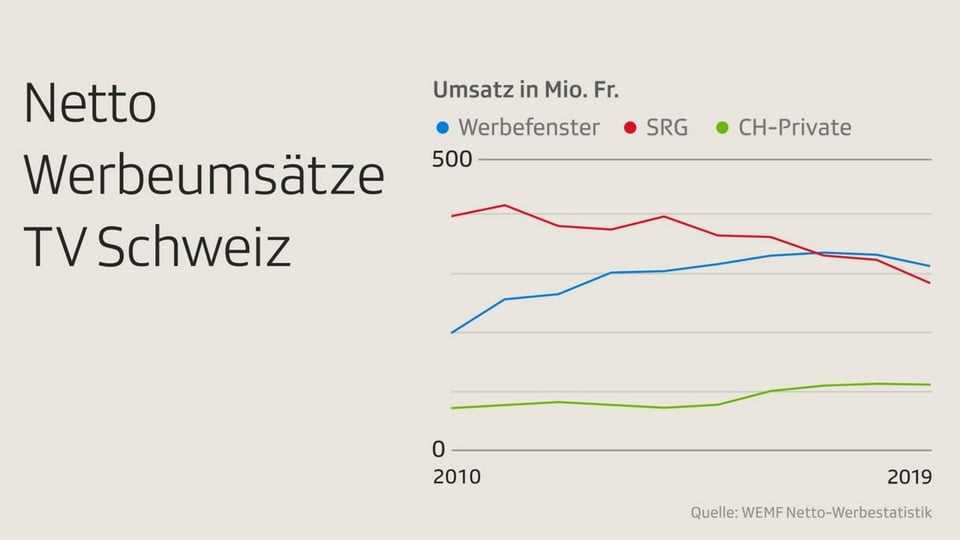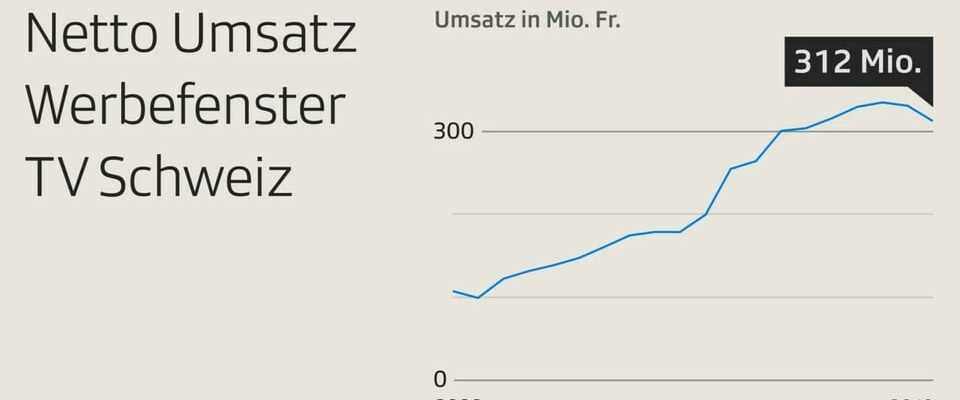contents
For 30 years, Swiss politicians have been trying to get money from RTL and Co. Because they earn millions in Switzerland with the advertising money. The film law – also known as “Lex Netflix” – would now make this possible for the first time.
The RTL show “Deutschland sucht den Superstar” also has many fans in Switzerland and has already achieved a market share of 9 percent. If you watch the show in Switzerland, you will see advertising that is only shown to viewers in Switzerland – the so-called advertising window. And these advertising windows are a billion dollar business.
There have been figures on this since 2000. 312 million Swiss francs were implemented in 2019 alone. Over four billion in the last 20 years. Swiss advertising francs, most of which are acquired by the Zurich-based company Goldbach, on behalf of RTL and Co.
Legend:
Goldbach Managing Director Alexander Duphorn explains why advertising windows work so well: “The viewers have an attractive program, and the brands in turn benefit from an attractive advertising offer. And of course there are companies such as spot productions, media agencies or marketers who ultimately live from the relevance of the market.»
Private broadcasters don’t stand a chance against foreign broadcasters
26 advertising windows from abroad are currently beaming into Switzerland. The best-known channels are German, such as RTL and Pro Sieben, but French and even American channels also earn money here. Now even more than all SRG stations combined (SRF, RTS, RSI) per year. Even the private Swiss TV stations with around 100 million Swiss francs in advertising revenue don’t stand a chance against the foreign broadcasters.

Legend:
So a lot of money is leaving Switzerland. Swiss politicians have been trying to counteract this for 30 years – so far in vain. In 1992, Adolf Ogi was Federal Councilor and Media Minister. At the time he had resisted these advertising windows. Publicist Matthias Ackeret, who wrote his doctoral thesis on Swiss TV law, remembers: “The Federal Council didn’t want to allow that at all.
But that didn’t work at all, because at the end of the 1980s Switzerland signed a European agreement according to which the European TV market was to be completely liberalized – the birth of the advertising window. » And since then – for 30 years – politicians have been trying to stop the outflow of millions in the Federal Palace.
The Federal Council always gave the same answer
Luzi Stamm, who was still in the National Council for the FDP at the time, protested in 1993 immediately after the start of the first advertising window and wanted to know whether the Federal Council was ready “to end the RTL advertising split immediately?” Politicians from the SVP and the SP hit the same note.
But the Federal Council’s answer was always the same: “From an international legal perspective, we cannot impose any obligations on the foreign organizers of Swiss advertising windows, because they are not subject to our law at all,” said Federal Councilor Moritz Leuenberger in 2005.
Streaming providers are causing the EU to rethink
This is how European law was until recently – Switzerland is also involved in the film sector: every country invests in its own filmmaking, and foreign organizers could not be asked to pay. The market entry of the US streaming providers changed this rule: Because now countries like Germany and France are experiencing for themselves what it means when millions are withdrawn from the market – just as Switzerland has been experiencing with the advertising windows since 1993.
The streaming providers therefore led to a rethink in the EU: it should now also be allowed to ask foreign broadcasters such as Netflix or the advertising window operators to pay. Like other countries, Switzerland reacted: After 30 years of unsuccessful attempts to retain some of the millions in advertising windows in Switzerland, the National Council and the Council of States have finally been able to implement this with the new film law. For the time being, because whether the law really comes into force will be decided on May 15 at the ballot box.
